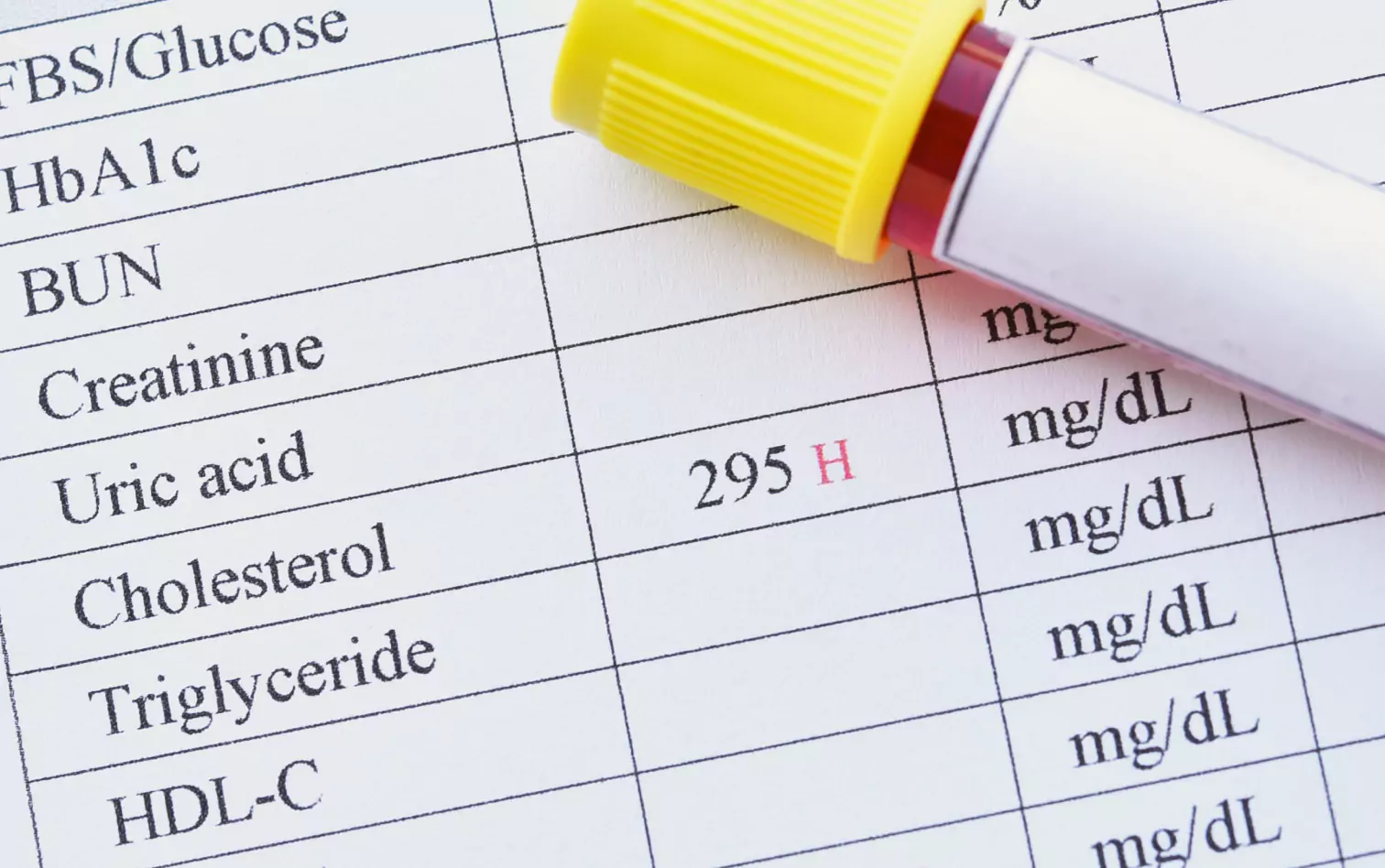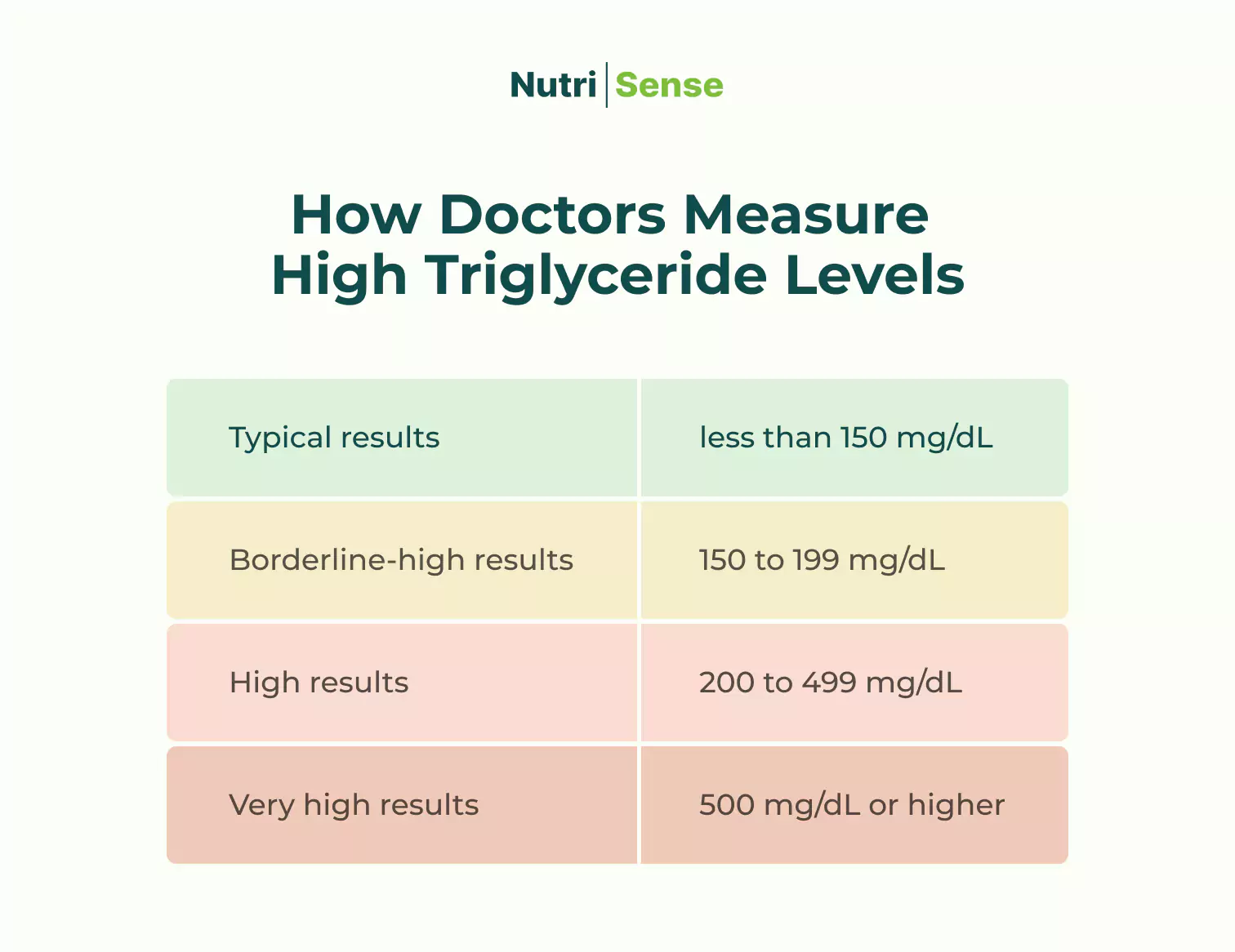Triglycerides and Blood Glucose [+Tips to Lower Triglyceride Levels]

Key Takeaways
Did you know that high triglycerides and blood glucose levels are linked? Well, they are! It's essential to keep blood glucose and triglyceride levels within a healthy range to maintain good health. But to understand why that is, you first need to understand more about triglycerides.
Triglycerides are a type of fat found in the blood vessels. Elevated blood triglyceride levels can increase your risk of developing many health conditions, including cardiovascular disease, liver disease, kidney disease, and diabetes.
Elevated blood glucose levels (the sugar content in your bloodstream) can also lead to health problems. Having high triglycerides and blood glucose levels at the same time increases your risk of heart attack, stroke, increased blood pressure, and other serious health problems. But how are triglycerides and blood glucose related?
What are Triglycerides?

Triglycerides are a type of lipid (fat) found in the blood, but there's more to it than that. If you've ever had your blood drawn for a cholesterol test, you may have heard mention of triglycerides. Triglycerides are the most common type of lipid in the human body. Their composition includes three fatty acids and one glycerol molecule, and they're usually produced by the body to store energy.
You typically find them in dairy products, meat, and oils. Triglycerides also come from excess calories in the diet. Your body turns these extra calories into triglycerides and stores them in fat cells. Many factors can contribute to high triglyceride levels, including diet, exercise, weight, and genetics.
Causes of High Triglyceride Levels
In the United States, high triglyceride levels are widespread. Approximately 26 percent of U.S. adults have high triglyceride levels, which means that about 1/4 of us are at risk of developing heart disease, stroke, and other cardiovascular problems down the road.
If your doctor has told you that you have high triglyceride levels, it's essential to understand what that means and what you can do about it. Learning about the cause of your high triglycerides is the first step in taking action to lower them.
Wondering how doctors measure these levels? According to the University of Michigan, here's how high triglyceride levels are measured after blood testing:

Here are some causes that you should be aware of:
Mismanaged Type 2 Diabetes
One of the most common chronic illnesses in the United States is type 2 diabetes. The CDC estimates that 38.4 million Americans have type 2 diabetes, and as many as 97.6 million have prediabetes. Studies have shown that high triglyceride levels are linked to poor blood glucose control.
If you have diabetes and don't correctly manage your blood sugar levels, you may find your triglyceride levels and cholesterol levels climbing, potentially worsening your diabetes. So, balancing your blood sugar levels may help you control your triglyceride levels.
Consuming More Calories Than You Burn

What you eat is important, especially regarding your triglyceride levels. Consuming more calories than you burn may significantly contribute to high triglycerides. When we consume excess calories, this energy has to be stored.
The most common storage is fat, so the body packages it in the form of triglycerides. These are then transported into the bloodstream for storage in fat cells, causing elevated triglyceride levels. Staying aware of information like this could help you make better dietary choices and improve your health!
Eating Too Many High Carbohydrate Rich Foods
It's no secret that eating a healthy diet is vital for maintaining overall health. However, you may not know that consuming too many high carbohydrate foods with extra calories can cause your triglyceride levels to spike. When you consume too many calories and carbohydrates, you need to find a way to store this excess energy.
Your body converts sugar (glucose) into fatty acids and forms triglycerides. These triglycerides are then transported through the bloodstream to be stored in fat cells.
If you want to keep your triglyceride levels within a healthy range, it's essential to watch your overall calorie and carbohydrate intake. Next time you're grocery shopping, stock up on healthy protein and low-carbohydrate foods like fruits and vegetables.
Insulin Resistance

Insulin resistance is when the body doesn't use insulin properly. Insulin is a hormone that helps the body use glucose for energy. When you have insulin resistance, your blood sugar levels can become too high. When this occurs in your body, the excess sugar in the bloodstream gets converted to fatty acids. So, understanding your blood glucose levels and insulin resistance is crucial to understanding your overall health.
If you're worried about your triglyceride levels, talk to your doctor about getting tested for insulin resistance. Treatment for insulin resistance can help improve your triglyceride levels.
Hereditary Factors
Did you know that high triglyceride levels can be hereditary? It means that if your parents or grandparents have high triglyceride levels, you're more likely to experience them as well. There's a condition called familial hypertriglyceridemia, passed down in families.
Genetic defects may cause the disorder in tandem with environmental factors. Hypertriglyceridemia is often diagnosed alongside high blood glucose levels (hyperglycemia), obesity, and high insulin levels.
Medications
Did you know that a large number of medications may cause high triglyceride levels? If you're taking prescription medications, you should know whether what you're taking can cause high triglyceride levels. If you're taking medication and have concerns about your triglyceride levels, be sure to talk to your doctor.
Some medications that may cause high triglycerides include:
- Beta-blockers
- Birth control pills
- Estrogen
- Steroid hormones
- Diuretics
- Certain cardiovascular medications
- Immunosuppressants
- Anabolic Steroids
Tips For Lowering Triglycerides Levels

Most Americans are familiar with cholesterol, but triglycerides often go unnoticed. Levels of triglycerides in the blood can be a strong predictor of heart disease, so it's essential to know how to keep them under control. By making simple changes to your lifestyle, you can dramatically reduce your risk of developing long-term health complications. Luckily, there are several things you can do to lower your triglyceride levels.
Here are a few tips to help you begin lowering your triglyceride levels:
- Lose weight if you're overweight or obese. Carrying too much extra weight contributes to high triglyceride levels. Metabolic health is vital to controlling triglyceride levels.
- Eat a healthy diet low in saturated and unhealthy fats and include plenty of fruits and vegetables. Avoid dietary choices that are high in refined sugar and simple sugar, including fruit juices, white rice, potato chips, baked goods, and white bread. Instead, opt for brown rice and whole-grain options.
- Avoid eating late in the evening.
- Track your daily calories intake and monitor your blood glucose level with a continuous glucose monitor.
- For people with type 1 and type 2 diabetes, and gestational diabetes, managing good blood sugar control can lower your triglyceride levels and your blood cholesterol levels.
- Exercise regularly. The American Heart Association recommends at least 150 minutes of moderate-intensity activity or 75 minutes per week of vigorous exercise. Even small changes, such as taking the stairs or brisk walking, can make a significant difference in lowering triglyceride levels and weight loss.
- Limit your alcohol intake. High alcohol intake has been shown to cause elevated triglycerides.
- If you smoke, consider quitting, as studies show a direct correlation between smoking and elevated triglyceride levels.
- Eat foods that are high in healthy fats and omega-3 fatty acids, such as fatty fish, olive oils, and avocados. These good fats have been shown to lower triglyceride levels.
- Consider adding supplements like fish oil and niacin into your diet, as they can also help to lower your triglyceride
Engage with Your Blood Glucose Levels with Nutrisense
When elevated, triglyceride signals potential risks for cardiovascular diseases, diabetes, and other serious health conditions. Similarly, consistent blood glucose management is fundamental for preventing the adverse effects of diabetes and other metabolic disorders.
Together, these factors underline the importance of a balanced lifestyle, including a nutritious diet, regular physical activity, and vigilant health monitoring.
With the Nutrisense CGM program, you gain access to an advanced continuous glucose monitoring (CGM) system, designed to offer real-time insights into your blood glucose trends. This innovative tool empowers you to make informed decisions that align with your health objectives.
Nutrisense doesn't just provide technology; it connects you with a team of expert dietitians and nutritionists, ensuring personalized guidance tailored to your unique health journey. They will answer your questions, review your data, and provide actionable advice to assist you in achieving your goals.
Our team is dedicated to supporting you every step of the way, providing valuable insights and practical advice to help you achieve optimum health. Start today by taking our quiz to see how Nutrisense can guide you towards your health goals.
Find the right Nutrisense programto turn insight into progress.
Go Beyond Glucose Data with Nutrisense
Your glucose can significantly impact how your body feels and functions. That’s why stable levels are an important factor in supporting overall wellbeing. But viewing glucose isn't enough. Nutrisense, you’ll be able to learn how to use your body's data to make informed lifestyle choices that support healthy living.
One-to-one coaching
Sign up to access insurance-covered video calls to work with a glucose expert: a personal registered dietitian or certified nutritionist who will help tailor your lifestyle and diet to your goals.
Monitor and measure what matters
With the Nutrisense CGM Program, you can monitor your glucose with health tech like glucose biosensors and continuous glucose monitor (CGM)s, and analyze the trends over time with the Nutrisense App. This will help you make the most informed choices about the foods you consume and their impact on your health.
Find your best fit
Ready to take the first step? Start with our quiz to find the right Nutrisense program to help you take control.

Katie is a dietitian at Nutrisense. With over 11 years of experience as a dietitian in many areas of nutrition, Katie has worked as a clinical dietitian within a hospital, as well as in the fields of diabetes, sports and performance nutrition, recovery from addiction, and general wellness. She’s also an athlete and has run 8 marathons, including the Boston Marathon.




